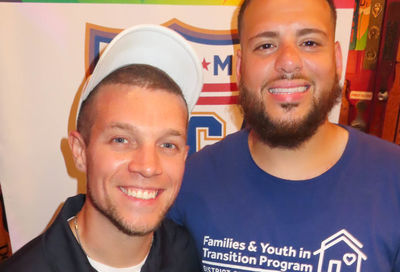Florida trans student’s fight to access boys’ restroom heads to 11th Circuit
Lawsuit alleges school board's restroom policy for trans students is unconstitutional and a form of sex discrimination

On Thursday, the 11th U.S. Circuit Court of Appeals will hear a discrimination lawsuit brought by a transgender teenager who sued his local school district after he was barred from male-designated facilities.
Drew Adams, a recent graduate of Allen D. Nease High School in Ponte Vedra, Fla., was initially allowed to use the boys’ restroom during his freshman year, after he and his mother informed the school that he had officially transitioned in 2015.
But after someone filed an anonymous complaint about Adams’ presence in the boys’ restroom, the school reversed course and told him he could only use gender-neutral restrooms, citing the policy of the St. John’s County School Board.
Enlisting the help of Lambda Legal, Adams sued the school board, alleging that the policy sends a message to transgender students that they are undeserving of the privacy, respect, and nondiscrimination and anti-harassment protections that have been afforded to their cisgender peers.
Lambda Legal also argued that the policy violates the Equal Protection Clause of the Fourteenth Amendment and protections against sex discrimination contained in Title IX of the Education Amendments Act of 1972.
A lower court agreed, finding in Adams’ favor. In his opinion, U.S. District Judge Timothy Corrigan, of the Middle District of Florida, wrote that allowing Adams to use the boys’ restroom “poses no threat to the privacy or safety of his fellow students,” as the school board and Nease High School administrators have claimed. The school board subsequently appealed the decision.
On Thursday, the 11th Circuit will hear oral arguments at the Elbert P. Tuttle Courthouse in Atlanta. In advance of those arguments, attorneys general from 21 states and the District of Columbia, as well as major medical organizations and many for-profit corporations with pro-LGBTQ policies, have submitted briefs urging the court to find in Adams’ favor by upholding the lower court’s ruling.
Besides upholding or rejecting all aspects of the lower court’s ruling, the 11th Circuit could also issue a split ruling, such as one in which it decides that the St. John’s County School Board’s policy violated Adams’ right to equal protection, but did not rise to the level of sex discrimination.
“The district court was very clear when it stated that the law requires that Drew be treated like any other boy,” Tara Borelli, counsel at Lambda Legal and Adams’ attorney, said in a statement. “As the district court found, schools must provide all students with equal treatment at school, including transgender students.”
Read more:
South Carolina Republican wants to ban transition-related care for transgender youth
Transgender sex worker kidnapped and robbed at gunpoint in the Bronx
Florida father abandoned son on highway because he might be gay
Support Metro Weekly’s Journalism
These are challenging times for news organizations. And yet it’s crucial we stay active and provide vital resources and information to both our local readers and the world. So won’t you please take a moment and consider supporting Metro Weekly with a membership? For as little as $5 a month, you can help ensure Metro Weekly magazine and MetroWeekly.com remain free, viable resources as we provide the best, most diverse, culturally-resonant LGBTQ coverage in both the D.C. region and around the world. Memberships come with exclusive perks and discounts, your own personal digital delivery of each week’s magazine (and an archive), access to our Member's Lounge when it launches this fall, and exclusive members-only items like Metro Weekly Membership Mugs and Tote Bags! Check out all our membership levels here and please join us today!
























You must be logged in to post a comment.